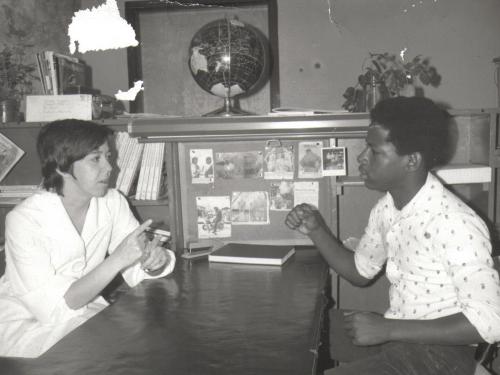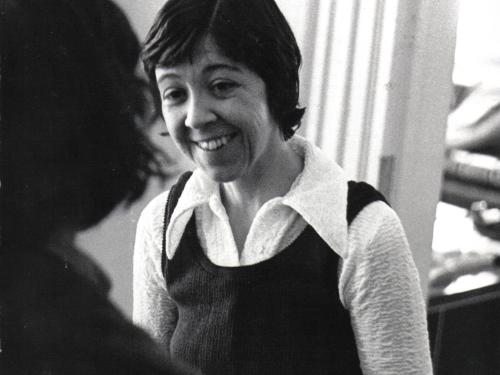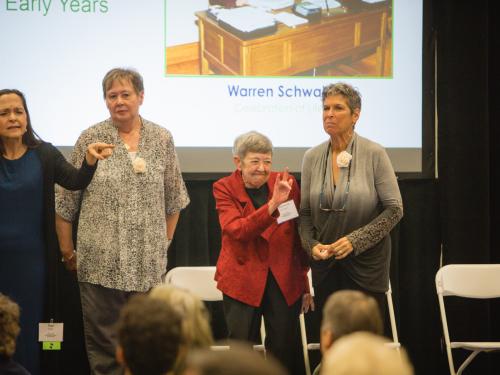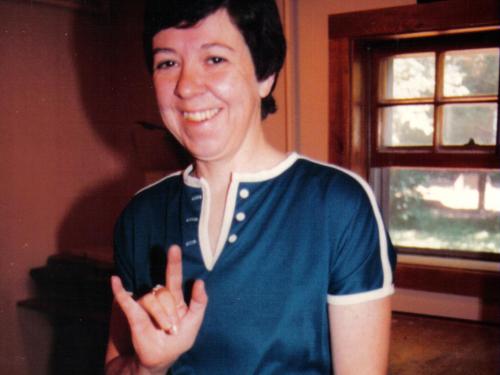In 1970, TLC was established based on the pioneering ideas of its founders Warren Schwab, Maureen O'Donnell, Wayne Farrell (later O’Farrell), and Dermont Keohane. They were dedicated to a revolutionary approach to deaf education—combining “total communication” with the unstructured, informal atmosphere of open classrooms. The curriculum was based on the “discovery method,” allowing students to wander freely to stations within the classroom that focused on topics such as nature, math, reading, art, and woodworking. No rows of desks, no time schedules, no standardized readers. The archaic approach of rigid rows of students facing forward to focus on lip reading was banished. TLC became the first school in Massachusetts to use total communication to teach deaf and hard of hearing students.
Maureen O’Donnell passed away on July 31, 2022, after an extended illness. TLC aims to recognize her contributions to its school and our organization with this tribute, submitted by her family:
A Pioneer Moves On To New Frontiers
Maureen was born in Waltham, Mass. and grew up in Claremont, N.H. She attended Emmanuel College in Boston, graduating in 1965, and earned a master’s degree in Deaf Education from Columbia University in 1967. She later attended Boston College earning a Master of Social Work degree.
In 1967, Maureen began a 45-year career in deaf education. Her first teaching job was at the Crotched Mountain School in Greenfield, N.H., where she met Warren Schwab. In 1970, TLC was established based on the pioneering ideas of its founders Warren, Maureen, Wayne Farrell (later O’Farrell), and Dermont Keohane. They were dedicated to a revolutionary approach to deaf education—combining “total communication” with the unstructured, informal atmosphere of open classrooms. The curriculum was based on the “discovery method,” allowing students to wander freely to stations within the classroom that focused on topics such as nature, math, reading, art, and woodworking. No rows of desks, no time schedules, no standardized readers. The archaic approach of rigid rows of students facing forward to focus on lip reading was banished. TLC became the first school in Massachusetts to use total communication to teach deaf and hard of hearing students.
TLC began with five classrooms rented from St. Stephen’s Parochial School. The starting budget required some creative frugality to provide lesson materials and supplies such as “dissecting” small broken appliances for science classes, outdoor walks to illustrate or write about observations, and running a “Kool Aid” store to raise funds for field trips as well as provide lessons in math and measurements. TLC also reached out to other professionals such as the National Theater of the Deaf, whose members demonstrated the art of mime, puppetry, and body language. The success of these interactions soon led to the addition of drama to the TLC curriculum. The staff in the early years of TLC wore many hats and bonded through their teamwork in addressing day-to-day challenges while staying focused on advancing the dream of optimizing the education and well-being of deaf and hard of hearing students.
Before TLC, deaf children in Massachusetts who did not or could not learn orally had to seek education at facilities in nearby states. TLC made a world of difference for so many families—students could commute to school daily instead of leaving the state; children misdiagnosed with brain damage now thrived within a stimulating and supportive learning environment; and frustrated students unable to lipread, who acted out with bad behavior, experienced academic success for the first time.
Within a few years, the success of TLC necessitated a larger space, and it moved to its current location—at the time a 14-acre property with a large house (“The White House”) whose rooms were re-purposed for use as administrative offices, classrooms, and housing for some of the initial staff. As the school grew, so did Maureen’s role at TLC. After obtaining her MSW degree, Maureen served as the school’s senior clinical social worker and its primary psychotherapist, helping students and families with issues complicated by communication challenges. Her efforts led to an expansion of social services and initiatives that address behavioral health.
The innovative ideas of TLC’s founders and staff provided a solid foundation for the school to grow in size and reputation to the multi-building, internationally known campus we see today. That the revolutionary methods implemented from TLC’s beginning became the standard in most education programs for the Deaf and Hard of Hearing across the country—and no longer seem novel—is a testament to their success. Maureen was very proud to be part of the revolution.
Old pioneers never die, they simply move on to new frontiers.




